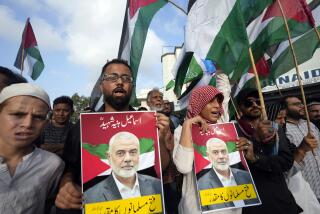Justice for Lebanon
- Share via
A SPECIAL UNITED NATIONS investigator provided more compelling evidence last week of Syria’s involvement in the February assassination of former Lebanese Prime Minister Rafik Hariri. But in case anyone still had any doubts, another Lebanese politician, newspaper publisher Gibran Tueni, was killed by
a bomb in his car Monday, a day after his return from refuge in France. Tueni, who had fled to escape death threats, was, like Hariri, a sharp critic of Syria’s control over Lebanese politics.
German prosecutor Detlev Mehlis reported evidence that “high-ranked Syrian officers” were involved in Hariri’s death, as were Lebanese officials who have been arrested. Syria sent troops next door into Lebanon in 1976, soon after its civil war started, and kept them there until Hariri’s killing sparked such an international outcry that it was forced to bring the soldiers home. But Damascus still controls much of Lebanon’s intelligence network and business community.
Mehlis said that although his team was able to interview five top Syrian officials, President Bashar Assad’s government continues to block the U.N. probe. Especially telling were reports from witnesses that Syrian intelligence documents concerning Lebanon had been burned. Syria’s claims that it could find no material relating to Hariri’s killing in intelligence archives points to a thorough whitewash.
Despite the intransigence, the Security Council declined to impose sanctions on Damascus, instead settling Thursday for extending the investigation for six months. Secretary-General Kofi Annan needs to ensure that whoever leads the probe is as tough-minded and competent as Mehlis, who agreed at the start of his work to serve only until the end of this year. If Assad keeps stonewalling the United Nations, the world body needs to impose sanctions. Political assassinations must be punished, not just decried.
Lebanese officials have asked for an expansion of the investigation to include other political killings (including Tueni’s), a reasonable request. The Security Council also should consider whether a trial of those accused in Hariri’s killing can be held in Lebanon. If the country’s judicial apparatus is still too fractured after decades of civil war and occupation to be functional, an international tribunal should undertake the trial.
Lebanese sickened by Syria’s continued sway over their country need support from outside their borders; the killings are driving Christians, Druze and Shiite Muslims into their separate corners again in a distressing reminder of the civil war. Holding killers accountable could be one step in stopping a renewal of sectarian bloodshed.
More to Read
Sign up for Essential California
The most important California stories and recommendations in your inbox every morning.
You may occasionally receive promotional content from the Los Angeles Times.













